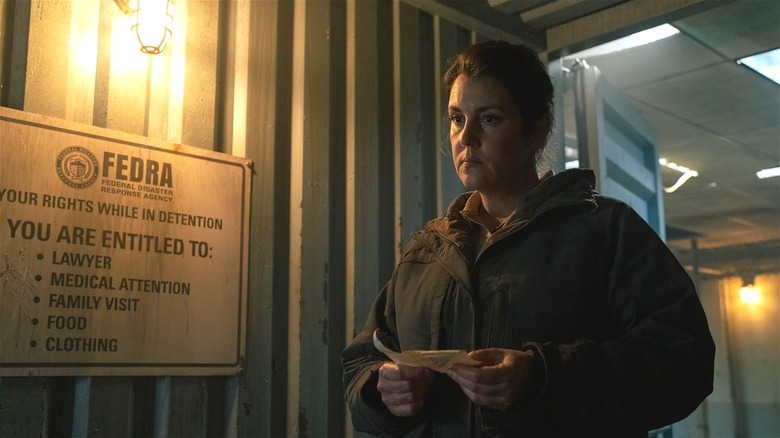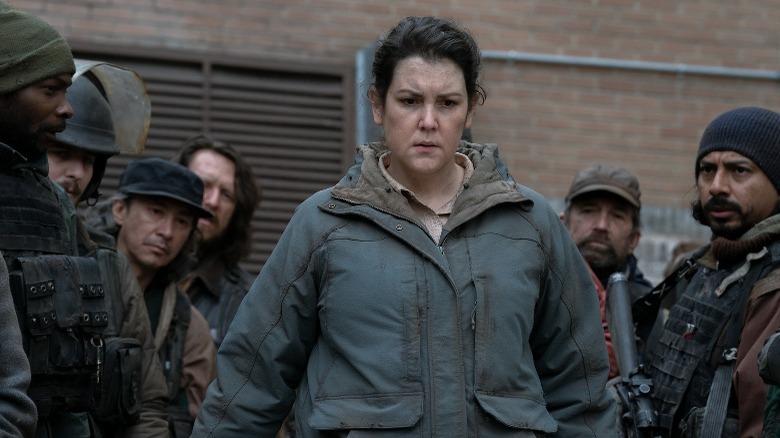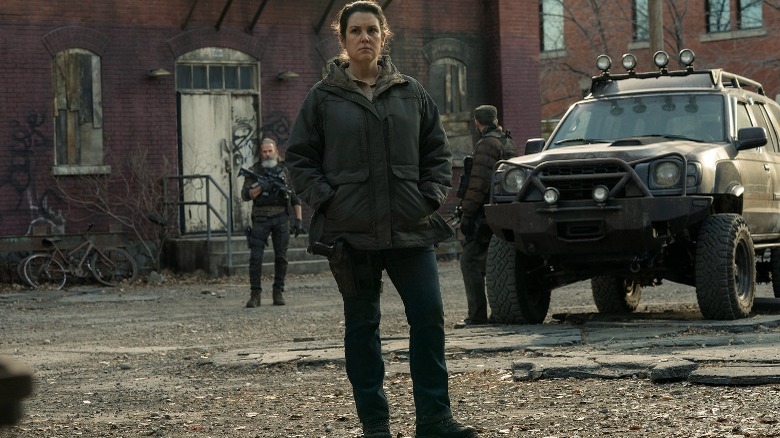Melanie Lynskey Made Her The Last Of Us Character Delicate On Purpose
The world of HBO's "The Last of Us" is populated with droves of infected who seek to assimilate and reproduce as a formidable hive mind. Even greater threats lurk in the shadows in the form of corrupt governments and unchecked resistance groups, along with rogue runaways and dangerous, predatory men who use the apocalypse as an excuse to act upon their hideous impulses. Among these multifarious threats that emerge as obstacles for Joel (Pedro Pascal) and Ellie (Bella Ramsey) is a resistance leader whose soft-spoken demeanor adds a dangerous edge to her ruthless commitment to personal retribution. Kathleen Coughlan, played to perfection by Melanie Lynskey, is a force to reckon with in the show's fourth episode, wherein she hunts down a pair of brothers and is ready to eliminate anyone who stands in her way.
Some pockets of "The Last of Us" fanbase completely misunderstood Kathleen, as they misconstrued her apparent softness as a mark of weakness, deeming it not "compelling" enough within the context of "The Last of Us." However, one only has to delve into the interpersonal dynamics that she shares with her group to understand her character better — Kathleen is not only a capable resistance leader but someone indispensable to the overthrow of the FEDRA garrison, and her actions so far have only proven that she commands respect. There is no need for her to terrorize her men, as they naturally look up to her for what should be planned next, and her delicate nature only reinforces her as a complex, well-written character.
Lynskey weighed in on this herself when she spoke to Glamour about Kathleen, and explained why the character's softness was a deliberate part of her arc, and why it should not be conflated with meekness.
A deliberate choice
Before diving into Kathleen's character, Lynskey spoke at length about being perceived as "delicate" in real life, although people who know and understand her are aware of how she's "really tough." Positioning this personal experience as a segway to how Kathleen is perceived in "The Last of Us," Lynskey clarified that she made "a very deliberate choice to make her feminine." There's a good reason why Kathleen carries herself the way she does, which the actor explains succinctly:
"I wanted her to seem like somebody who had been underestimated and was then put into this position where she had a lot of power, and she did great until she messed it up at the end by going after her personal vendetta."
The show sets up an essential difference between Kathleen and her deceased brother Michael, who harbored an idyllic vision of societal harmony in the post-cordyceps world. Although Michael was loved and respected for the man he was, it was Kathleen who led the resistance against corrupt FEDRA groups and reclaimed the QZs with sheer brute force. Michael's death is clearly the catalyst for Kathleen's obsession with revenge — often at the cost of many, many lives — and the fact that she feels so deeply yet is capable of such coldness is what makes her truly terrifying.
Lynskey also filled in on the possible backstory that potentially led Kathleen to assume this position of power. She might not have been the one strong-arming the corrupt or the infected, but she definitely was the kind of person everyone would turn to for key information. She is the one with "all the answers," as she can softly, yet strategically retrieve information from people, while not hesitating to immediately pull the trigger after she gets what she needs.
A quick transition
Michael's sudden death left a power vacuum in the resistance group, and Kathleen emerged as the natural successor, with the transition occurring pretty quickly. Her personal loss sharpened her ruthless nature, and she was forced to completely shed all notions of gentleness in a world that is predominantly unforgiving. This makes her a complex antagonist, as she is not downright villainous as David, but her need for vendetta leads to her eventual downfall.
Kathleen's softness is not a mask either, as it is a very real aspect of her personality. In the scene in which she reminisces about her brother, we see glimpses of a scared child in need of comfort, which accentuates the pain of personal loss. This manifests in a brand of villainy that is layered and complicated, as Kathleen can give the order to kill a child with a soft whisper, and her men will carry it out without question. Her apathy towards Sam, who is only a child, is the by-product of her bitter, extremist worldview, where she believes that children like Sam must pay for their crimes, even if it is simply by association. Kathleen's sense of justice is scary as hell.
Lynskey rounds off her thoughts on Kathleen by (rightly) stating that one does not always have to be hyper-masculine or tough to be a compelling villain, as power/authority can manifest in various forms. In a show where folks are struggling to make it through to the next day, what a complex, corrupt authority figure looks or sounds like should be the least of one's concerns. Kathleen is quietly commanding, and the turbulent emotions deep within her that slowly slips through her calm exterior are more terrifying than any rugged, foul-mouthed antagonist that might exist in such a messed-up world.


